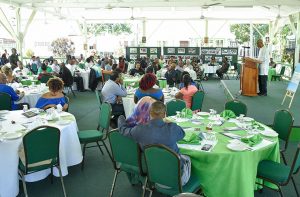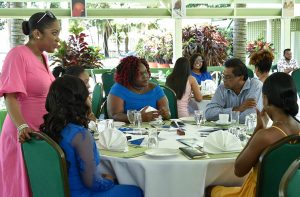…urges fairness at annual media brunch
A PUBLICATION on the history of the press in Guyana is nearing completion and will mark the fulfilment of a promise made by President David Granger to the Guyana Press Association (GPA) last year to assist the body in ensuring that present and future journalists are aware of their history.
The book, almost completed, will receive the input of the press association and was sneak-peaked to the gathering at the 2020 Annual Media Brunch to commemorate the 75th Anniversary of the GPA on Sunday. Holding the book up for all to see, the President said it is arranged into four main parts; the first deals with the colonial era between 1793 and 1840.

He explained that during this period, many of those who were seated there that day would not have been allowed a voice. The second part deals with the pluralist phase of the press between 1840 and 1940, which the President said saw newspapers which catered to various ethnicities along with other news outlets.
“It was a very complex period in which the people who are coming to Guyana under different means — either those in indentureship, those in enslavement or other migrants — wanted to express themselves. So, during this period between 1840 and 1940, there were a lot of ethnic papers in which people articulated their grievances and expectations of different ethnic groups, as well as other business groups and so on,” he explained.
The third part of the book examines the years from 1940 to 1970 called the ‘nationalist period,’ during which President Granger said that Guyanese yearned for independence and the newspapers reflected this. The fourth part delves into the ‘socialist period’ between 1970 and 1990 when the Head of State recounted that people felt that domination of the international media and other big companies in the developed countries did not adequately represent their views.
This leads to the fifth part of the book — still being edited – called the reformist period from 1990 to the present, where there is greater liberalisation and the emergence of new media. “This book will deal with most of what I have discussed just now.
Unfortunately, my present occupation doesn’t give me the opportunity to do the research which I would like to do and much of the writing here will conclude in the first decade of this millennium, but I will complete it. I’ve just had some discussions with your president, Nazima, and she seems to be doing some work on her own and we will see if we could maybe add to it, so that new entrants into the profession will be guided by what occurred in the past and will try to make the future much better,” the President said.
“Right now, it is up to about 134 pages, it’s more or less complete, including an index and all of the references and sources.” He encouraged the GPA to keep itself alive and well-performing as the country’s earnest watchdog in years to come.

He also reinforced his vow to make an annual subvention to the GPA coming from his funds called the National Endowment For Science and Technology (NEST) to assist the association – without interference —with training for 2020. This, he explained, would be made available in the 2020 budget to be presented after the coming General and Regional Elections.
Meanwhile, remarks came too from GPA President Nazima Raghubir, who stated that even while the evolving press brings many challenges, journalists must continue the fight against disinformation and, local journalists, more so during the elections period.
She urged media operatives to take seriously their roles and to ensure that the public is always presented with impartial information they can rely on. “The media’s role has also been to provide impartial and factual information on any event we report on. It is even more critical during this period leading up to elections, during and following elections,” the GPA head said.
“Our roles are much more different than those of social media commentators; we are to provide factual and unbiased information to our readers and audience. This means that we have to put our fact- checking journalism skills to use, ask questions, clarify, research, ensure there is a right of reply, provide that balance. As we have entered an electoral season, I would like to re-emphasise a point made right here last year: we have to ensure that we remain independent, factual and that our work cements social cohesion rather than fracture it.”

As the GPA celebrates its 75th Anniversary this year, Raghubir also reminisced on the history of the press and all that has changed over the years. She noted that the press must now work even harder to remain economically viable through becoming diversified and implementing better business models. Even so, she urged all stakeholders to consider what a true, independent media could mean for the country. The GPA was formed in 1945 and is the second oldest press association in the Region.
Members of the government present at the event included Vice-president and Minister of Public Security, Khemraj Ramjattan; Vice-president and Minister of Indigenous Peoples’ Affairs, Sydney Allicock; Minister of Foreign Affairs, Dr. Karen Cummings; Minister of Finance, Winston Jordan; Joseph Harmon, Director-General, Ministry of the Presidency; and Minister of Legal Affairs, Basil Williams. Present too were several executive members of the GPA.



.jpg)








